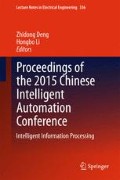Abstract
In order to enhance the recognition performance of the i-vector speaker recognition system under unpredicted noise environment, an improved local preserve projection which was used for reduce dimension to i-vector is proposed on this paper. First, the nonzero eigenvalue is rejected when we solve the optimized objective function, only using the eigenvalue the value of which is greater than zero. A mapping matrix is obtained by solving a generalized eigenvalue problem which can settle the singular value problem which occurred in the traditional local preserve projection algorithm. The experiment result shows that the recognition performance of the method proposed in this paper is improved under several kinds of noise environments.
Access this chapter
Tax calculation will be finalised at checkout
Purchases are for personal use only
References
Kinnunen T, Li HZ (2010) An overview of text-independent speaker recognition: from features to supervectors. Speech Commun 52:12–40
Tohidypour HR, Seyyedsalehi SA, Behbood H, Roshandel H (2012) A new representation for speech frame recognition based on redundant wavelet filter banks. Speech Commun 54:256–271
Perrachione TK, Del Tufo SN, Gabrieli JDE (2011) Human voice recognition depends on language ability. Science 333:595
Eskikanda PZ, Seyyedsalehia SA (2012) Robust speech recognition by extracting invariant features. Procedia Soc Behav Sci 32(3):230–237
Yang S, Zhaozhuang J, Deliang W (2009) An auditory based feature for robust speech recognition. ICASSP, Taibei, pp 4625–4628
Wu D, Cao J, Wang J, Li W (2012) Multi-feature fusion face recognition based on Kernel discriminate local preserve projection algorithm under smart environment. J Comput 7(10):2479–2487
Du J, Huo Q (2011) A feature compensation approach using high-order vector taylor series approximation of an explicit distortion model for noisy speech recognition. IEEE Trans Audio Speech Lang Process 19(8):2285–2293
Jeong Y (2010) Speaker adaptation based on the multilinear decomposition of training speaker models. In: Proceedings of the IEEE international conference on acoustics, speech and signal processing, Dallas, USA pp 4870–4873
He Y, Han J (2011) Gaussian specific compensation for channel distortion in speech recognition. IEEE Signal Process Lett 18(10):599–602
Dehzangi O, Mab B, Chng ES, Li H (2012) Discriminative feature extraction for speech recognition using continuous output codes. Pattern Recogn Lett 33:1703–1709
Gu XH, Gong WG, Yang LP (2011) Supervised graph-optimized locality preserving projections. Opt Precis Eng 19(3):672–680
Dehak N, Kenny P, Dehak R, Dumouchel P, Ouel-let P (2010) Front-end factor analysis for speaker verification. IEEE Trans Audio Speech Lang Process 19(99)
Acknowledgments
This work was supported in part by the National Science-technology Support Plan Project of China under contract 1214ZGA008, the Nature Science Foundation of China under contract 61263031, and the Science Foundation of Gansu Province of China under contract 1010RJZA046.
Author information
Authors and Affiliations
Corresponding author
Editor information
Editors and Affiliations
Rights and permissions
Copyright information
© 2015 Springer-Verlag Berlin Heidelberg
About this paper
Cite this paper
Wu, D. (2015). Speaker Recognition Based on i-Vector and Improved Local Preserving Projection. In: Deng, Z., Li, H. (eds) Proceedings of the 2015 Chinese Intelligent Automation Conference. Lecture Notes in Electrical Engineering, vol 336. Springer, Berlin, Heidelberg. https://doi.org/10.1007/978-3-662-46469-4_12
Download citation
DOI: https://doi.org/10.1007/978-3-662-46469-4_12
Published:
Publisher Name: Springer, Berlin, Heidelberg
Print ISBN: 978-3-662-46468-7
Online ISBN: 978-3-662-46469-4
eBook Packages: EngineeringEngineering (R0)

